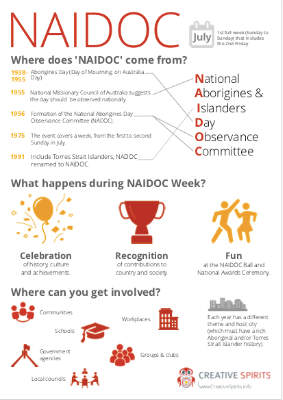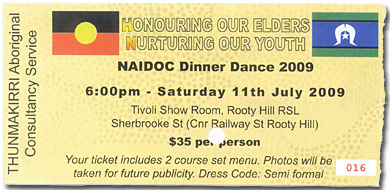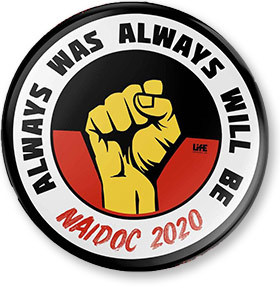History
NAIDOC Week
NAIDOC Week is predominantly held in the first full week of July and is a time to celebrate Aboriginal history, culture and achievements.

Wishing you knew more about Aboriginal culture? Search no more.
Get key foundational knowledge about Aboriginal culture in a fun and engaging way.
This is no ordinary resource: It includes a fictional story, quizzes, crosswords and even a treasure hunt.
Stop feeling bad about not knowing. Make it fun to know better.
NAIDOC Week 2023
NAIDOC Week is from 2 – 9 July 2023.
The 2023 National NAIDOC theme is "For Our Elders"
Elders are a fundamental part of First Nations communities. They are wisdom keepers, have witnessed the many changes, and are a vital bridge between the modern world and First Nations culture. Elders often are the leaders of communities. There is no time more urgent to sit down and listen to Elders than now.
History of NAIDOC Week

NAIDOC stands for National Aborigines and Islanders Day Observance Committee.
NAIDOC Week has its origins in Aboriginal protest and activism when Aboriginal communities boycotted Australia Day which led to the Day of Mourning.
From 1938 until 1955, the Day of Mourning, also known as Aborigines Day, was held annually on Australia Day as a protest to the day's celebrations.
In 1955 Aborigines Day was shifted to the first Sunday in July after it was decided the day should be a celebration of Aboriginal culture rather than a protest – or, as some believe, to remove the protest from Australia Day. [1]
Major Aboriginal organisations, state and federal governments, and a number of church groups all supported the formation of the National Aborigines Day Observance Committee (NADOC, without the 'I') in 1956. This committee was responsible for organising national activities.
At the same time, the second Sunday in July became a day of remembrance for Aboriginal people and their heritage.
In 1975, it was decided that the event should cover a week.
With a growing awareness of the distinct cultural histories of Aboriginal and Torres Strait Islander peoples, NADOC was expanded to also recognise Torres Strait Islander people and culture. In 1991 the committee became known as the National Aborigines and Islanders Day Observance Committee (NAIDOC).
This new name is now the title for the whole week, not just the day.
When is NAIDOC Week?
NAIDOC Week is held in the first week (a Sunday to Sunday) of July that incorporates the second Friday – which historically was celebrated as 'National Aboriginal Day'.
What happens during NAIDOC Week?
Each year, a new theme is chosen to reflect the important issues and events for NAIDOC Week.
NAIDOC Week celebrations are held across Australia to celebrate the history, culture and achievements of Aboriginal and Torres Strait Islander peoples. NAIDOC is celebrated not only in Aboriginal communities, but by Australians from all walks of life. Local community celebrations during NAIDOC Week are encouraged and often organised by communities, government agencies, local councils, schools and workplaces.
The Committee makes key decisions on national NAIDOC activities including the host city, the theme and the National NAIDOC Poster Competition winner.
At the end of every NAIDOC Week, the National NAIDOC Awards are announced at a ceremony and ball held in the host city.
The annual NAIDOC Awards recognise the outstanding contributions that Aboriginal Australians make to improve the lives of Aboriginal people in their communities and beyond, or to promote Aboriginal issues in the wider community, or the excellence they’ve shown in their chosen field.
For many Aboriginal people a NAIDOC ball is the highlight of the year and they travel hundreds to kilometres to reconnect with their families, to network and meet other members of their communities.
I went to our local council and asked what they did for NAIDOC Week. I was met with blank faces, and asked to explain what it meant.
— Annie Moore, a Koorie woman from Victoria [2]
Aboriginal thoughts
For some Aboriginal people, NAIDOC Week is less about their achievements and more about their ongoing struggle.
Nakkiah Lui, an Aboriginal actor, writer and comedian, wants to know why Aboriginal people cannot have one day to mourn their past.
"Why is this country so afraid to let us have one day – one day out of 365 days, out of who knows how many days since 1788 – to observe and recognise and mourn our past, that still affects our lives today. Why does everything have to be turned into a celebration about culture and reconciliation? Why must the reality of disadvantage be made problematic, as if acknowledging it prevents us from ever moving forward? ... Until my people have received the recognition they deserve, for the dispossession and trauma they continue to endure, I won't celebrate." [1]
An Aboriginal woman writes in a blog article: "The bare bones of what NAIDOC week is really about... is about the people that came before us, who were fed the f*** up with being classed as animals and plants, people who were smacked down every time they tried to change their lot in life." [3]

What can you do during NAIDOC Week?

Here are a few suggestions for activities to celebrate:
- Display the NAIDOC Poster or other Aboriginal posters around your classroom or workplace.
- Start your own hall of fame featuring Aboriginal role models.
- Listen to Aboriginal musicians or watch a movie about Aboriginal history.
- Make your own Aboriginal trivia quiz.
- Study a famous Aboriginal Australian.
- Research the traditional Aboriginal owners of your area.
- Study Aboriginal arts and crafts.
- Create your own Aboriginal art.
- Run an art competition for your school or community.
- Research Aboriginal history online or visit you library to find books about Aboriginal peoples.
- Visit local Aboriginal sites of significance or interest.
- Learn the meanings of local or national Aboriginal place names and words.
- Invite local Aboriginal Elders to speak or give a Welcome to Country at your school or workplace.
- Invite an Aboriginal sports person or artist to visit you.
- Invite Aboriginal dancers to perform.
- Host a community BBQ or luncheon.
- Hold a flag raising ceremony.
- Organise a smoking ceremony.
For more information and current dates visit www.naidoc.org.au.